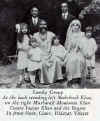| the-south-asian.com SEPTEMBER 2001 | ||
| about us contact us data bank past issues the craft shop the print gallery | ||
|
SEPTEMBER 2001 Contents Interview Heritage Cultural Heritage of south Asia People Communities Lifestyle Films Editor's Note
Books
|
Page 1 of 5
'The Princess who would be Spy' World War II SOE Agent - Princess Noor Inayat Khan 1 January 1914 - 13 September 1944 by Andy Forbes Noor Inayat Khan was one of the most romantic of the SOE agents and one whose suitability to be sent into the field has often been questioned. The great-great-grand-daughter of the legendary Tipu Sultan, the 18th century Muslim ruler who died in the struggle to stem the British conquest of Southern India. Her father was a leader of the Sufi mystic community. Her mother was an American related to Mary Baker Eddy, the founder of Christian Science.Inayat Khan, Noor's father, took his family to pre-revolutionary Russia, where they were taken up by members of the Imperial Court and where a daughter was born in the Kremlin on New Year's Day, 1914. She was given the name Noor, meaning 'light of womanhood', and would be known by her father's name, the patronymic Inayat, and the title Khan, an honorific denoting aristocratic birth.Inayat Khan moved the family to London shortly before the outbreak of the First World War but poverty and prejudice led to another move, this time to the outskirts of Paris. Gentle, shy, sensitive, musical, dreamy, poetic Noor lived by what her biographer called 'a different rhythm' from the other children.
Copyright © 2000 - 2001 [the-south-asian.com]. Intellectual Property. All rights reserved. |
|


